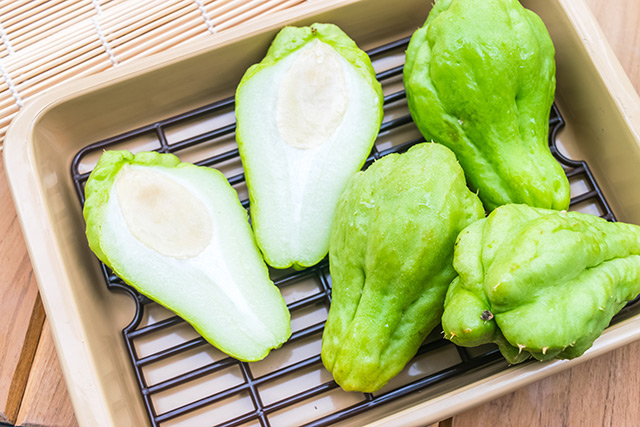02/19/2022 /by Joanne Washburn
Chayote (Sechium edule) is a type of summer squash that belongs to the gourd family. It’s well-known in the Southwestern United States, but it remains a novelty food item in other parts of the country.
Though botanically considered a fruit, chayote is eaten like a vegetable. All parts of this gourd are edible, including its flowers, seeds and skin. The chayote’s pale green flesh is crisp when raw and softens when cooked. Beloved for its cucumber-like mild and slightly sweet flavor, chayote can be used in many dishes and cooked in different ways.
Chayote has many of the vitamins and minerals you expect to find in a good vegetable. It also contains a host of powerful compounds and cancer-fighting antioxidants. In fact, a study by biology students showed that chayote may help prevent and treat lentigo maligna melanoma, a type of invasive skin cancer.
Chayote has the potential to treat skin cancer
Lentigo maligna melanoma develops from Hutchinson’s melanotic freckle. It usually grows on the surface layer of the epidermis – the upper or outer layer of the two main layers of cells that make up the skin – but it actually begins developing below the skin’s surface.
People with a family history of skin cancer, have light skin and have a history of skin spots face a greater risk of developing lentigo maligna melanoma than those without any of these characteristics. Experts also believe that too much unprotected sun exposure is a major risk factor as well for developing this type of skin cancer.
To address this concern, a group of biology students from Indonesia – where there are over 3,300 new cases of melanoma annually – sought to find a natural cure for lentigo maligna melanoma.
In the study, they used chayote to make an ointment that can treat the condition. They used the green gourd because it is a common agricultural crop in Indonesia. But while chayote is often used in cooking, its skin or rind is tough, so it is often removed. As such, chayote skin remains underutilized even though it secretes a clear, latex-like liquid that could be beneficial for health.
To determine the cancer-fighting compounds in chayote, the students ran several tests using a cell line with the same proliferation character as lentigo maligna melanoma cells. They used chayote paste as a test sample.
They confirmed that chayote contains saponins and flavonoids with anti-cancer potential. They then processed chayote to obtain an extract and ran an anti-proliferation test using that. The results of the test showed that the extract can help inhibit the growth of skin cancer cells.
Thanks to their findings, the students successfully processed the chayote extract into an ointment that they say can be applied to cancerous moles.



